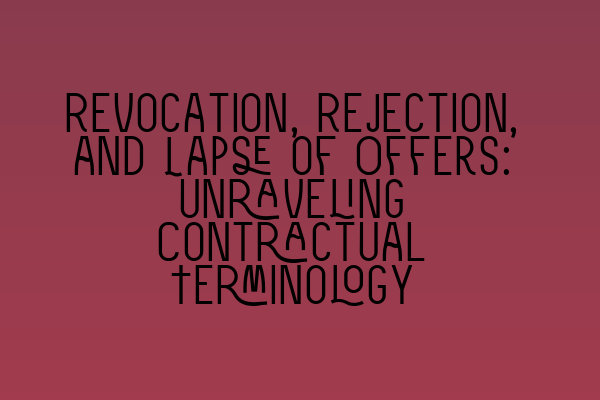Revocation, Rejection, and Lapse of Offers: Unraveling Contractual Terminology
Introduction
In the world of contract law, understanding the terminology surrounding the revocation, rejection, and lapse of offers is crucial. These terms dictate the validity and enforceability of contracts, and a lack of understanding can lead to costly legal disputes. In this blog post, we will dive deep into the intricacies of these concepts to unravel the complexities of contractual terminology.
Offer Revocation
One of the fundamental principles of contract law is that an offer can be revoked or withdrawn by the offeror at any time before it is accepted by the offeree. This means that the offeror has the power to change their mind and retract their offer without any consequences.
However, it’s important to note that revocation of an offer must be communicated effectively to the offeree. Simply changing one’s mind without proper notification does not constitute a valid revocation. The offeree must be made aware of the revocation in order for it to be legally binding.
The timing of the revocation is also crucial. Once the offeree has accepted the offer, the offeror can no longer revoke it. This is known as the “mailbox rule,” which states that an offer is deemed accepted when it is properly posted, regardless of when it is received by the offeror.
Offer Rejection
On the other side of the spectrum, the offeree has the power to reject an offer. This rejection can be explicit, where the offeree clearly communicates their refusal to accept the offer, or implicit, where the offeree’s actions indicate a refusal to accept the offer.
It’s important to understand that a rejection of an offer terminates the offer completely. The offeror cannot then reconsider and accept the offer once it has been rejected. If the offeror wishes to continue negotiations, a new offer must be made.
Offer Lapse
Offers can also lapse due to the passage of time or other specified conditions. When an offer lapses, it becomes invalid and cannot be accepted by the offeree. The length of time an offer remains open is typically specified by the offeror, and if the offeree fails to accept within that time frame, the offer automatically lapses.
Additionally, an offer can lapse if it is subject to a specific condition that is not met within a designated time period. For example, if an offer is contingent upon the approval of a third party and that approval is not obtained within the specified time frame, the offer lapses.
Conclusion
In the complex world of contract law, understanding the concepts of revocation, rejection, and lapse of offers is crucial. These terms dictate the validity and enforceability of contracts, and a lack of understanding can lead to costly legal disputes.
We have explored the intricacies of these concepts and how they impact the dynamics of contractual agreements. While offers can be revoked by offerors, rejection of an offer by the offeree terminates the offer completely. Furthermore, offers can lapse due to the passage of time or failure to meet specified conditions.
By having a thorough understanding of these concepts, both offerors and offerees can navigate the negotiation process with confidence and ensure that their contractual agreements are legally sound.
Related Articles:
– SQE 1 Practice Exam Questions
– SQE 1 Practice Mocks FLK1 FLK2
– SQE 2 Preparation Courses
– SQE 1 Preparation Courses
– SRA SQE Exam Dates
